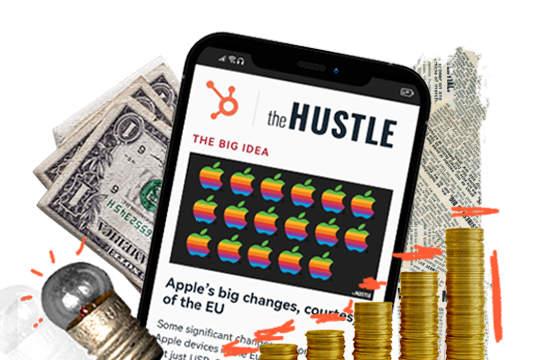- Beyond The Wealth
- Posts
- Bootstrap vs Fundraise
Bootstrap vs Fundraise
Which is the right choice for your business!
Sponsored By:
Attention founders: Raise capital on your terms using DealMaker
Bootstrapped vs Fund Raising
Over the last 18 months, I’ve had the pleasure of interviewing over 110 founders and CEOs. One of my favorite topics to explore with them is the choice between bootstrapping and fundraising. Not only does this decision reveal a lot about the founder and their business, but it often comes with incredible stories.
Let’s start with the basics: what’s the difference between bootstrapping and fundraising?
A bootstrapped business is one that’s started and grown using the entrepreneur's personal savings, resources, or revenue generated by the business itself. It doesn’t rely on external funding like venture capital, angel investments, or bank loans.
On the other hand, a fundraised business secures external capital from investors or financial institutions to support its startup, growth, or expansion. This approach helps accelerate operations or achieve specific milestones, but it often comes at the cost of equity or decision-making control.
Which Approach Is Right for Your Business?
Every business is different. Some are naturally suited for bootstrapping, while others depend heavily on fundraising to succeed.
Bootstrapping works best for businesses with low startup costs and minimal capital requirements. Founders can retain full equity and control, but it often means getting scrappy and operating lean in the early stages.
Fundraising is ideal for capital-intensive businesses that require significant resources to scale and thrive. For example, industries like biotech, hardware, or marketplaces often need external funding to reach critical mass.
Key Advice from Successful Founders
One thing I’ve consistently heard from successful founders is this: treat those you fundraise with as if you’re getting married.
All cash is not created equal.
Who you raise money from and give equity to will become your partner. You’ll be talking to them on a weekly or bi-weekly basis. If they don’t align with your vision or you don’t get along, it can spell disaster for your business. Choosing the right investors is as important as the money itself.
The Evolving Fundraising Landscape
Fundraising isn’t what it used to be. In the past, it was reserved for highly successful companies, and getting in touch with venture capitalists was nearly impossible. Today, companies like DealMaker (shoutout to today’s sponsor!) are revolutionizing the process. They allow founders to raise capital on their own terms, opening up opportunities for companies that previously didn’t have a seat at the table.
Final Thoughts
At the end of the day, you’re the founder, and you know what’s best for your business. Both bootstrapping and fundraising have produced highly successful and wealthy founders. There’s no one-size-fits-all answer—it all depends on your business model, goals, and resources.
So, what’s your approach? Is your company bootstrapped, or have you raised capital?
Reply to this email and let me know—I’d love to hear your story!
Safeguarding Your Wealth and Building a World-Class Law Firm
This week on Beyond The Wealth, I had the privilege of sitting down with Blake Harris, founder of Blake Harris Law, the asset protection law firm specializing in offshore trusts and wealth preservation. From starting his practice over a decade ago to helping clients globally secure their assets, Blake shared invaluable insights into asset protection, entrepreneurship, and building a business designed to serve at the highest level.
For entrepreneurs, founders, and business owners, Blake’s advice is clear: protect your assets before it’s too late.
The Power of Offshore Trusts
Blake’s firm helps clients avoid lawsuits by creating offshore trusts that shield assets from creditors.
How It Works: Assets are moved into trusts located outside U.S. jurisdiction, making them inaccessible to domestic courts.
Who It’s For: Contrary to popular belief, you don’t need to be a billionaire to benefit. Most of Blake’s clients have between $1M and $10M in assets, and the majority of lawsuits target individuals worth less than $2M.
“It’s better to avoid a lawsuit than to win one.”
Key Lessons from Blake Harris
Client Service is Everything
Blake’s firm culture prioritizes accessibility and excellence. With over 70 perfect Google reviews, his approach proves that exceptional service builds lasting trust.
Leverage Social Media for Growth
Social media isn’t just for influencers. Blake’s TikTok presence has helped him attract high-net-worth clients, including a billionaire referral.
Takeaway: Don’t wait for the perfect video. Start posting consistently and refine over time.
Proactive Protection Pays Off
From divorces to business disputes, lawsuits are unpredictable but inevitable for many. By setting up asset protection early, you safeguard your wealth and gain peace of mind.
Entrepreneurship and Resilience
Blake’s personal journey highlights the grit required to build a successful practice:
He started with no connections in Denver, Colorado, grinding for clients and working every single day for 10 years.
Today, his firm operates globally, with a remote team built on trust and flexibility.
“The sun never sets on the offshore industry.”
Takeaways for Founders
Protect Your Assets: Don’t assume lawsuits won’t happen to you. Be proactive and create a safety net.
Invest in Your Business: Blake reinvests in his firm, confident that it generates the highest returns.
Focus on What Matters: Build a supportive team, prioritize health, and choose the right partner in life and business.
What steps are you taking to protect your wealth and secure your future? Let’s discuss.
- Andres Sanchez
Beyond The Wealth





Reply